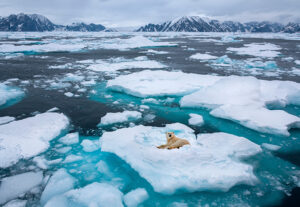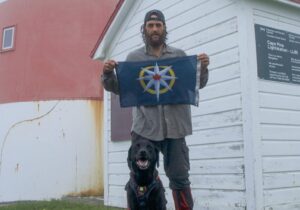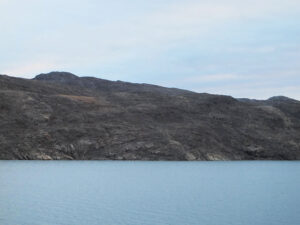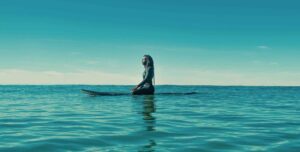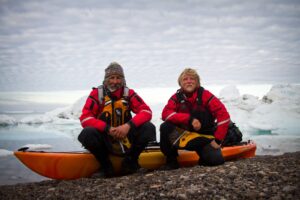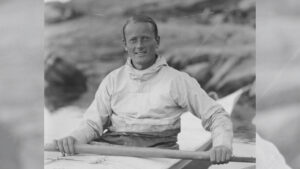Explorer Charlie Walker wanted to blaze a new trail through the Russian Arctic. Instead, he spent a month in a Siberian prison. Here, he tells us the story.
Yakutsk is a world away from Kiev, over 9,000km away, in fact. Alone in the arctic wilderness, the British explorer initially hoped that distance would be enough to keep him safe. He had no way of knowing that just being a foreigner was now dangerous.
The Russian army had rolled into eastern Ukraine just three days after Walker flew into the remote city of Yakutsk. He had planned an ambitious 1,600km ski and sled expedition along the frozen Lena River, learning about the region’s indigenous population as he traveled. The plan almost immediately fell apart, the result of a combination of canceled flights, thigh-deep snow, and horrific gale-force winds along the coast. He adjusted on the fly, reluctant to give up on an expedition long in the making.
Major change of plans for Charlie Walker
“I flew from Yakutsk to Batagay, a bit further north, and followed a different river system, the Yana,” he told me on the phone from London.
He was now trekking rather than skiing, but he still aimed to cover 1,000km of sparsely populated Russian wilderness. The first three weeks went fairly smoothly. Mostly, Walker camped.
“Roughly once per week, I stayed in villages. The longest I went without passing a settlement was 12 days.” But his interactions with some locals hinted at trouble.
Some people regarded him suspiciously, perhaps fearing what associating with a foreigner might mean to the authorities. Those who did want to speak with him would inevitably bring up Russia’s “special operation” in Ukraine. Walker spoke with an abundance of caution. Despite this, these conversations would later be used against him.

Walker covered 1,000km solo. Photo: Charlie Walker
First interrogation
Just before the tiny village of Ust-Kuiga, the local police were waiting for him. From the back seat of their car, Walker spent an hour patiently answering their questions in his basic Russian. Walker explained that he was a travel writer, interested in the local culture.
The next day it emerged that they were going to fine him for “conducting journalism on a tourist visa”. The fine was only about $25 and Walker assumed that perhaps he was just an inconvenience for these small-town cops. He continued on his journey, pulling his sled out of town towards his next objective, the Omoloy River.
As Russian troops attempted to encircle Kiev, Walker ticked off the kilometres, closing in on his final destination, the town of Tiksi on the shores of the Laptev Sea. Unfortunately for Walker, roughly half of Tiksi’s population are military personnel. And unknown to him at the time, the government had built an array of missile silos there in 2018. Whether this had any bearing on Walker’s arrest is impossible to say, but the area’s strategic importance was an unhappy coincidence, to say the least.

Russia’s far northeast is sparsely populated, with small frontier-style villages dotting the landscape. Photo: Charlie Walker
Second interrogation and arrest
Having found an apartment in town, Walker soon received a knock from two stern-looking policemen. They drove him to the police station and asked now-familiar questions. What was he doing there? Why was he “asking provocative questions about the special operation” in Ukraine?
The questioning went on for hours and it was not until Walker asked to leave that he realized that he was under arrest. His request denied, he was next accused of photographing military infrastructure. It was an odd accusation, considering that the police had not even looked through his photos and later gave him back his camera without wiping the memory card.
Having chosen a journey revolving around long periods of isolation, Walker now had isolation imposed on him. Instead of windswept tundra and bleak beauty, he had a far bleaker solitary cell. A court appearance was quickly arranged.
Unsurprisingly, considering that Russian courts have an estimated 99% conviction rate, they found him guilty. The sentence was another fine, this time $60, a five-year ban from Russia, and deportation. All things considered, it didn’t sound too bad.
“An over-zealous official was always a worry,” Walker explained.

There’s nothing quite like getting fingerprinted to bring home the seriousness of a situation. Photo: Charlie Walker
Charlie Walker’s month in a Siberian prison
Initially, he thought the police would allow him to deport himself. Instead, they took him to pack his bags. He was flown to a small two-story detention center in Yakutsk, accompanied every step of the way by bailiffs. He would spend a month here. His only contact with the outside world was three supervised 15-minute periods a week with his phone. A couple of guards had the disturbing habit of referring to him as a spy.
A local friend helped him to organize an appeal to deport himself, which was swiftly rejected by a local judge. During his time with his phone, he liaised with his girlfriend, who worked with the British Foreign Office, to try and secure his release.
“There was not a great deal that could be done,” Walker explained. “It’s hard to pressure the Russian government.” He just had to wait and hope that a deportation flight would materialize before any new charges could be conjured up.

It wasn’t all police stations and interrogations. There was beauty too. Photo: Charlie Walker
Final interrogation
In the end, he got a two-day warning that he would finally be going home. A deportation flight would leave from Moscow, taking Walker and three Central Asian deportees to Dubai.
It was a massive relief, but he’d suffer one further ordeal before he could breathe easy. At Moscow’s Sheremetyevo airport, officials took him aside and questioned him again. His interrogators seemed more insistent than before, and he worried that they wouldn’t allow him to board the plane. But moments before the departure time, the police gave him his passport back and led him onto the plane. Only when the tires had left the tarmac did he allow himself to cry.
It’s an ordeal that would put most people off a place forever. Independent solo expeditions are hard enough without the threat of political imprisonment, but Walker doesn’t sound like he is done. I asked him if he could take any joy from the expedition at all, or if it had been too thoroughly overshadowed.
“That’s the best and hardest question. I haven’t yet fully answered this myself. The weeks I spent hiking were great, it was everything I wanted from the experience. I don’t want to regret this. I’m more interested in the region than ever.”
Charlie Walker paused for a beat and I could hear the London traffic. “I won’t be rushing back, though.”

